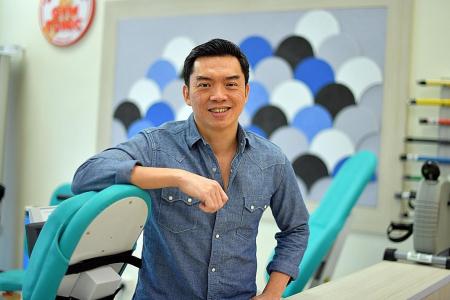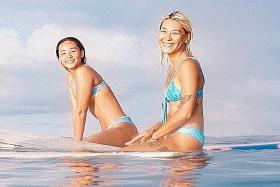Lien Foundation's Lee Poh Wah: Philanthrophy is not about being Santa
Lien Foundation chief Lee Poh Wah on philanthropy and how cancer changed him
In a field that prides itself on giving, Mr Lee Poh Wah does not see himself as a modern-day Santa Claus.
Instead, the chief executive of philanthropic house Lien Foundation is keen to separate charity from what he thinks philanthropy should be.
"Charity is like food for the human soul. It is acts of kindness. Philanthropy, as I define it, is more about problem-solving than playing Santa Claus.
"If you do philanthropy right, you actually reduce the need for charity," he said.
It is a rule of thumb the 47-year-old frequently returns to throughout the interview, and one that he finds is missing in the philanthropy scene today.
Since 2005, when Mr Lee started out, interest in the field has grown, with more foundations, more philanthropic advisers and events, and business schools teaching related modules.
But the potential of philanthropy has yet to be fulfilled partly because most foundations stick to grant-making.
The scene remains largely "pompous", said Mr Lee, where participants are "flattered and charmed".
Quoting US civil rights icon Martin Luther King Jr, he said: "Philanthropy is commendable, but we must not overlook the circumstances of (economic) injustice which make philanthropy necessary.
"So tackle the root cause of the problem."
Philanthropy is commendable, but we must not overlook the circumstances... which make philanthropy necessary.Mr Lee Poh Wah, quoting US civil rights icon Martin Luther King
But Mr Lee acknowledged the difficulty for foundations to take that leap of faith - Lien Foundation itself took 25 years to do so.
Founded in 1980 by Dr Lien Ying Chow, the foundation restricted its activities to making grants.
This changed in 2005, after he died.
The foundation hired Mr Lee as a senior programme manager "to challenge the status quo".
"The family wanted to try and change things, so they plonked an alien in there," said Mr Lee, with self-deprecating humour.
"I viewed (the job) as a start-up where you can challenge conformity and deference to dogma," he added.
The opportunity came at a time when Mr Lee had spent two years as a "disobedient civil servant" running a social enterprise fund.
By then, the mechanical engineering graduate had two years of experience in property investment and a Master of Business Administration.
He also joked that he went from "the height of hubris to eating humble pie" after his technology start-up folded during the dot-com boom and bust.
Some of Mr Lee's early projects with the Lien Foundation included breaking the silence around end-of-life issues.
It was a taboo subject Mr Lee felt deserved more attention.
"Most of these causes, we pick them because they are all big intractable problems that are neglected, shunned, but we feel that we can make some difference," he said.
And sometimes, a billion-dollar problem waiting to be solved can be underlying the taboo subject.
With half of our seniors here aged 65 and above identified as frail and pre-frail, frailty in the elderly is another overlooked issue that Mr Lee hopes to tackle with Gym Tonic initiative.
Launched in 2015 in nursing homes and senior care centres, it uses exercise as medicine for frail or pre-frail seniors through strength-training.
By next year, it will be extended to more than 32 locations in the community, nursing homes and eldercare facilities.
Mr Lee explained: "Frailty is linked to a higher risk of falls, fractures, frequent hospitalisation, disability, admission to nursing homes and even mortality.
"All these translate to higher caregiving burden and healthcare cost. It is important."
Mr Lee's fierce passion is something Peacehaven nursing home executive director Low Mui Lang can attest to.
Since 2006, the pair have been working on several eldercare initiatives, including Gym Tonic and the Jade Circle nursing home project.
Madam Low told TNP: "He is very proactive. He is not a man who says 'this is a good idea' and just dreams and hopes it will come about.
"He goes to the ground and looks at what the needs are."
For someone who used to be "bo chup" (Hokkien for couldn't-care-less) about such causes, Mr Lee's passion now may come as a surprise to some.
"When you encounter deaths, diseases or discontinuities in life, it will trigger you to contemplate life... I subscribe to post-traumatic growth.
"Maybe if you have the right kind of mindset, you will use trauma as an opportunity to reflect and search for meaning in life and hopefully become a better version of yourself," he said.
The former national dragon boater was referring to his Stage 3C colon cancer.
He was only 35 when diagnosed, and had just joined the Lien Foundation.
Barely three years before that, his younger brother, aged 30, had died of a sudden unexplained cardiac arrest while watching TV at home.
"In some ways, cancer cured my blindness because I became more focused with a new vision for the future," said Mr Lee, who is free from cancer now.
"Sometimes, I joke that my cancer experience is the second best thing that happened to me....
"It was liberating to see the hanging sword of Damocles and accept that somebody must be on the left side of the longevity bell curve," he added, referring to the Greek tale which imparts the moral that danger is ever-present, especially in positions of power.
The best thing, he added with a smile, was becoming dad to daughter Xeloda - named after his cancer drug - four years after his cancer diagnosis.
GOOD DEATH
Work and life converged again in 2013 when his father, a retired tyre salesman, had a near-fatal infection of the aorta.
Drawing lessons from the dying well campaigns he had run, he made it a point to communicate with his dad and housewife mum.
The difficult conversations paid off when his dad died in 2016.
"It was a good death - calm and considerate. There was sadness but no grief or guilt in the family. Our relationships were resolved and completed," said Mr Lee.
"I thought it was partly because of the knowledge and experience that I had dealing with my work. So whatever I do in terms of eldercare, my thinking is always: Is it good enough for my mum and me?"
Now, he lives life "more intensely, purposefully and spontaneously", as if he will not be around a year from now.
Mr Lee said with a laugh: "I sleep well, my bowels are moving, the ideas are flowing...
"I have energy in terms of learning and playing a role; I find joy in creating, joy in living. I laugh a lot with my daughter, who adores her dad.
"I am grateful to be alive, so what more can a man ask for? In hindsight, all this is good, all the trauma that happens to you... It is character building."
Get The New Paper on your phone with the free TNP app. Download from the Apple App Store or Google Play Store now



